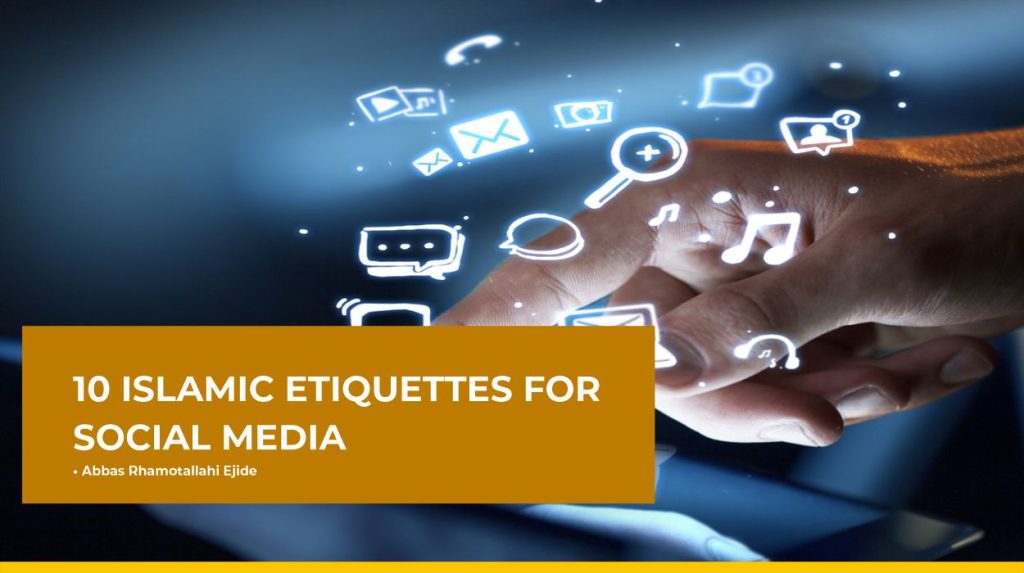Written by: Abbas Rhamotallahi Ejide
Introduction
In today’s world, social media has become an inseparable part of our lives. People engage in commerce, corporate, educational, recreational, social, and all other types of activities in the digital space. However, as Muslims, our online behavior is not exempt from Islamic values. The same principles of sincerity, modesty, truthfulness, and respect that guide our conduct in the physical world must also govern our digital interactions.
This article explores the Islamic etiquette for social media and digital life, because our posts, comments, and shares are all part of our record before Allah. For Islam is an all-encompassing religion.
1. Mind Your Intentions (Niyyah)
There are some people who earn rewards for every second they spend on social media, just as there are some people who amass sins for every second their interactions online. What brings about the difference in outcome is the intention in which each person makes use of the Web Space.
Before posting, ask yourself: Why am I sharing this?
The Prophet (peace be upon Him) said,
“Actions are judged by intentions…” (Sahih Bukhari, 1. Muslim, 1907)
If your aim is to seek attention, show off, or gain popularity, take a pause and renew your intention. Social media should be a platform for spreading goodness, knowledge, and positivity, not pride or competition.
2. Guard Your Tongue (i.e Your Typing)
Your posts on social media carry the same weight as your words in real life. Hence, every post you make backbiting, slandering, insulting, and mocking others goes directly on your scale of deeds. Allah subḥānahu wa ta’āla warns in Sūrah Hujurat:
“And do not backbite one another. Would one of you like to eat the flesh of his brother when dead? You would detest it.” (Qur’an Chapter 49, verse 12)
Before posting or commenting, imagine your words being read aloud on the Day of Judgment. Would you still write them?
3. Verify Before You Share
The internet is a fictitious place. Where there is more untrue information than true one. It is upon you as a believer to verify every piece of information before you pass it across to others, in order not to fall into lying, an unknown, propaganda or agenda. Most importantly because sharing unverified news or false claims is a serious matter.
Allah subḥānahu wa ta’āla commands:
“O you who believe! If a wicked person comes to you with news, verify it, lest you harm people in ignorance and then become regretful for what you have done.” (Qur’an Chapter 49, verse 6)
Sharing falsehood spreads confusion and can cause real harm. Verification before sharing is compulsory, whether it is a viral post, a “religious” quote, or breaking news.
4. Protect Your Modesty (Haya)
You will come across more people on social media than in real life. Anything that you are shy to say or show to strangers in real life must be kept away from strangers on the Internet for indeed, modesty is the jewel of faith.
The Prophet (peace be upon him) said,
“Every religion has its characteristics, and the characteristic of Islam is modesty.” (Ibn Majah, 4181)
Avoid posting pictures, videos, or captions that expose your ‘awrah, attract unnecessary attention, or compromise your dignity. Every believer, both male and female must strive to adhere to this etiquette because digital footprints remain, even after your demise.
5. Respect Others’ Privacy
It is against the teachings of Islam to expose each other even in moments of playful interactions. Do not share private messages, photos, or personal information without permission. Islam places great importance on amanah (trust) and privacy.
The Prophet (peace be upon Him) said:
“When someone tells you something and then looks around, it is a trust.” (Tirmidhi, 1959)
A true Muslim must respect the privacy of others, whether offline or online.
6. Avoid Showing Off (Riya)
Nowadays, most people can not do anything without uploading it on social media. Posting acts of worship, charity, or good deeds for likes and applause can nullify the reward of the act.
Allah subḥānahu wa ta’āla says:
“So woe to those who pray but are heedless of their prayer, those who show off.” (Qur’an Chapter, 107, verse 4-6).
Learn to keep your deeds sincere and private. Let your online presence inspire others without losing all of your rewards in the process.
7. Use Time Wisely
Endless scrolling on social media without any productive intent, also known as doom scrolling can rob you of valuable time to engage in Ibaadah. Same as binge-watching reels and aimless chatting can consume hours that could be used for productive or spiritual growth.
The Prophet (peace be upon Him) warned:
“There are two blessings which many people lose: health and free time.” (Sahih Al-Bukhari, 6412).
So yourself a favour by setting limits for your screen time. Ask yourself, is this bringing me closer to Allah or distracting me from Him?
8. Spread Goodness and Positivity
As said earlier, every one of your activities on the Internet shall be taken into account. If you use your platforms to uplift, educate, and inspire others, you shall earn the rewards in full measures.
The Prophet (peace be upon him) said:
“Whoever guides someone to goodness will have a reward like one who did it.” (Sahih Muslim, 1893)
Be the reason why people recite/listen to the Qur’ān, do their adhkar, or feel inspired.
9. Be Just and Kind in Disagreements
If you must disagree with someone online, do so respectfully. Avoid name-calling, sarcasm, or mockery. Online debates can easily become heated, but Islam teaches us to argue with wisdom and dignity.
“And do not argue with the People of the Book except in a way that is best…” (Qur’an Chapter 29, verse 46).
Disagreements can stem from anywhere; personal, religious, or that do not tally. Whichever one it is, never let the heat of the moment get you out of character for indeed, your manners are a reflection of your faith.
10. Lower your gaze online
The type of content you interact with online will determine what your social media feeds will look like. If you yourself are looking at the awrah of the opposite gender, you would be committing zina of the eyes, whereas, you could have configured your feed to show you only contents that are good for your soul and Deen.
Allah subḥānahu wa ta’āla (glorified and exalted be He) says,
“Tell the believing men to lower their gaze… And tell the believing women to lower their gaze…” (Qur’ān Chapter 24, verse 30-31)
Conclusion
As Muslims, we must stay true to our morals and values in every aspect of our existence. We are meant to embody Islam in every aspect of our lives; both offline and online. Social media is a test of character, sincerity, and self-control. It can be a tool for da’wah and goodness, or a source of sin and regret.
So let’s strive to make our digital footprint one that reflects iman (faith), ihsan (excellence), and akhlaq (good character).
Use your platforms with purpose. Type with taqwa. And let your posts be a source of ajr (reward), not regret. Barakallaahu Feekum.


